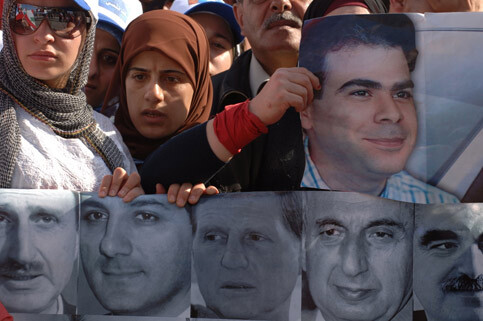Beirut 24 November 2006

Women holding photographs depicting assassinated Lebanese personalities at the mass funeral of Lebanese minister Pierre Gemayel, Beirut, 23 November 2006. Crowds carrying flags and chanting anti-Syrian slogans converged in central Beirut, turning the funeral into an impassioned political rally. (Dina Debbas/IRIN)
In the wake of Lebanese anti-Syrian Industry Minister Pierre Gemayel’s assassination on Tuesday the debate is raging on who was behind the killing and why.
Thursday saw hundreds of thousands of Lebanese from all sects on the streets turn out for his funeral.
They were there in genuine sadness at the murder of an elected cabinet minister and to show their disgust at the continued way violent killings are being used to conduct politics in Lebanon.
The protest also saw calls for pro-Syrian President Emile Lahoud to resign and much anger directed against the also pro-Syrian Shi’ite group Hizbullah - whose supporters stayed away from the proceedings.
While the majority of voices publicized in the media have cast blame for Gemayel’s assassination at Damascus’ door, the less reported voice of the majority of Shi’ites in Lebanon reveals a startling contrast to those on show in Martyr’s Square Thursday, an indication of the sharp polarization of opinion in Lebanon, which is more exposed today than at any time since the end of the 1975-90 civil war.
One 25 year-old woman, a moderate Shi’ite whose home in the southern suburbs of Beirut was blown up by Israel fighter planes in last summer’s Israeli-Lebanon war, does not buy the argument that Tuesday’s killing was an attempt by Syria or its agents to scupper the upcoming UN tribunal into the assassination of former Lebanese Prime Minister Rafik Hariri in 2005, as the March 14 government forces led by Hariri’s son Saad believe.
‘Gemayel’s murder was calculated to damage Syria and reinvigorate the waning power of the March 14 coalition which has been losing ground since Hizbullah successfully defended Lebanon against Israel,’ the woman who wished not to be named says.
‘The current government is dominated by supporters of American manipulation in Lebanon and is not a national unity government. Where are our representatives? The Shi’ites are 40 percent of the Lebanese population yet Hizbullah are sidelined by the Siniora government with no representation now.
‘Why does no one point the finger at Israel or America in this terrible murder of Pierre Gemayel? Where is the security provided by Siniora’s government? These are the questions I want answered. My home was destroyed by Israel in July, people I know were murdered by Israel in July. Why is there no UN investigation against Israel into their unlawful deaths?’
Rana Ballout, 32, a middle class Shi’ite and managing editor of luxury brand magazine Bespoke, was equally dismayed by Thursday’s demo.
‘I think the murder of Gemayel has to be investigated first before any accusations are made. But Prime Minister Siniora’s government has not managed to put together any findings into the deaths of any of the five political figures who have been assassinated under their watch since 2005. How can Syria be blamed so easily?’ she says.
Ballout agrees with Hizbollah’s line that the current government needs to go and a new national unity government must be formed with increased representation for Lebanese Shi’ites.
‘With the resignation of the five Shi’ite ministers the government no longer represents the majority of the people, and over the last 18 months they have done nothing to ensure security in the country,’ Ballout argues. ‘They did very little really to stop the war in the summer, even going so far as to have lunch with Condoleezza Rice while Lebanese were dying in the south.’
It is actions like that which Hizbullah’s supporters associate with Pierre Gemayel during the Israel-Lebanon war in July and August. They ask where was he when the people in the south were being killed by Israel. Over 1,000 Lebanese civilians were killed in the war.
Like many Hizbullah supporters Ballout is of the opinion that the real people who benefit from Pierre Gemayel’s death are Fouad Siniora’s government and the March 14 forces.
‘Those that benefited were certainly not Syria, Hizbullah or (Christian Presidential candidate and Hizbullah ally) Michel Aoun or any opposition party. The assassination added wind to the sails of the March 14 boat - it was about to capsize - as rumours of a thaw in Syrian-US relations were starting to spread after Syria’s overtures to Iraq in the last few days,’ she says. ‘Now the government is boosted.’
Despite these strong opinions there are Shi’ites who find themselves in the middle, not pro-March 14 but not pro-Hizbullah either.
‘I was on the streets today (Thursday) to protest against the continuing method of using political assassinations. It must stop,’ says Tarek El Zein, 27, a research analyst with mobile telephone company MTC in Beirut.
‘But I believe in Siniora’s government. It has not underachieved as Hizbullah claim. It has not been allowed to function properly with the pro-Syrian President Emile Lahoud and Hizbullah working against it. The Siniora government, with all its defects, is unjustly being hijacked,’ El Zein says.
‘All the people who have been assassinated since Prime Minister Hariri was killed in February 2005 have unfortunately been outspoken critics of Syria, including Pierre Gemayel. Is that a coincidence? Maybe but maybe not.’
Ramsay Short is British-Lebanese journalist, writer and blogger who has been covering Lebanon and the Middle East from Beirut for the past six years. At the beginning of 2006 he was appointed the first Editor-in-Chief of Time Out Beirut, the international guide to the arts, culture and entertainment scene. After four groundbreaking and highly successful issues the magazine was suspended during the Israel war on Lebanon. Before Time Out Beirut, Ramsay was Arts & Culture Editor for The Daily Star English language newspaper in Beirut for four years. Since the beginning of 2005 he has been the Beirut correspondent for British broadsheet The Daily Telegraph, and is a regular contributor to The Guardian newspaper’s Comment is Free blog.
Related Links


